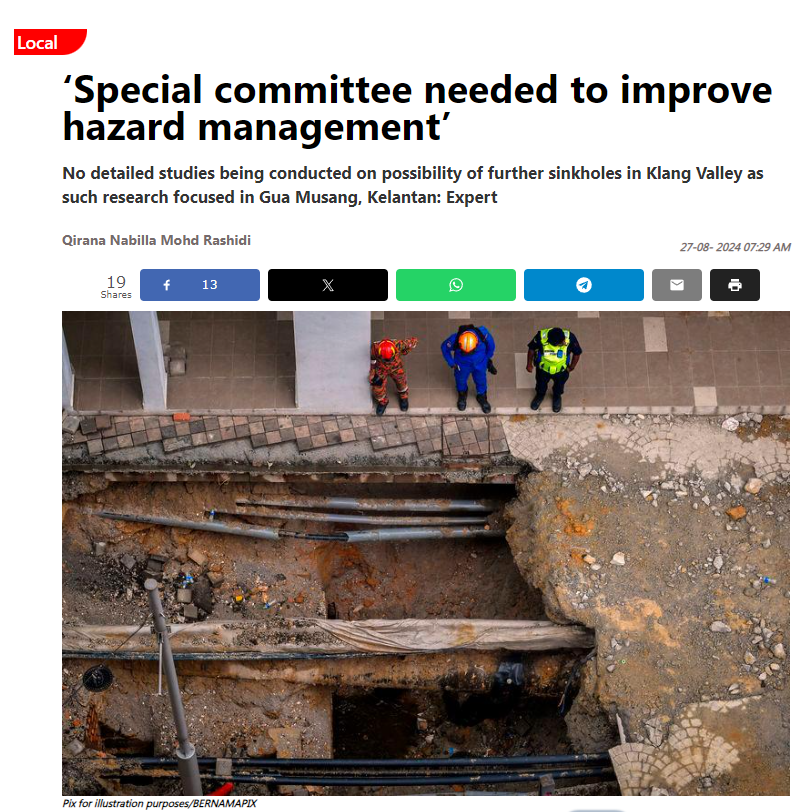
PETALING JAYA: In light of incidents involving sinkholes, a special committee that includes geologists, engineers, surveyors and town planners must immediately be set up to improve hazard management, said geologist and Universiti Malaysia Kelantan Geoscience Department lecturer Prof Dr Hamzah Hussin.
“While the Mineral and Geoscience Department is responsible for geohazards, forming a special committee would provide a more comprehensive approach to addressing such hazards,” he told theSun.
He said there is no detailed research being conducted by any government agency on the possibility of further sinkholes occurring in the Klang Valley and such research is focused in Gua Musang, Kelantan, which is located in a limestone area.
He said such studies are only carried out by contractors before developing major construction projects.
“A comprehensive geological study of the surface and subsurface area needs to be conducted urgently at high risk areas, with the findings incorporated within any design by a geotechnical engineer to ensure public safety.”
According to a research journal titled “Integration of Geoscience Information for Disaster Resilience in Kuala Lumpur, Malaysia”, only 20% of the city is highly suitable for development and not prone to climate hazards.
About 80% of the land area in Kuala Lumpur has medium to high ground constraints, including around 25% of the city area that is susceptible to landslides and floods.
“Over millions of years, acidic rainwater has worn away the limestone bedrock on which the city is built, creating a large network of underground cliffs, cavities and cracks that can range from small to massive in size.
“The size of subsurface openings varies due to limestone dissolution. For instance, the massive surface opening in Batu Caves can be seen but the huge cave system at the subsurface level is unexplored and its danger is unknown.”
Hamzah said cases of sinkholes appearing in the Klang Valley are few and within a limited area.
“This is normally caused by technical errors, such as leaking underground pipes and utilities or below-ground infrastructure construction.
“The sinkhole disaster in Guatemala in 2010 was 40m wide. It sucked down houses and killed three people after a major rainstorm. No tunnelling was ever involved, so if a similar sinkhole happens in Kuala Lumpur, it would be catastrophic.”
He said as a worst case scenario, a building could collapse if the sinkhole is large enough and although a national hazard identification study has been conducted, it only focused on landslides and debris flow.
Society for Engineering Geology and Rock Mechanics Malaysia president Dr Goh Thian Lai said sinkholes are often associated with post-construction maintenance as they are caused by the rapid lowering of the groundwater table and ground vibration.
“It is also caused by human activities, including piling works, quarrying, major construction or seismic activity. The Jalan Masjid India case in Kuala Lumpur is an anthropogenic sinkhole, which is caused by environmental changes and driven by human actions rather than natural processes.
“Detecting potential sinkholes involves field identification and the use of geophysical methods. Once potential sinkholes are identified, engineering measures are implemented to prevent subsequent consequences.”
He said geologists assess the risk of sinkholes in a given area by identifying signs of distress, such as tension cracks and early stages of subsidence.
He said the land on which KLCC and the Petronas Twin Towers are built is safe because these issues were addressed during construction.
The towers were shifted 60m to the Kenny Hill formation, which is not limestone, to avoid complex limestone or karst-related problems.
“The contractors also treated underlying limestone cavities. Nonetheless, authorities need to investigate if early signs of subsidence or large tension cracks have occurred near KLCC to prevent potential issues.”


